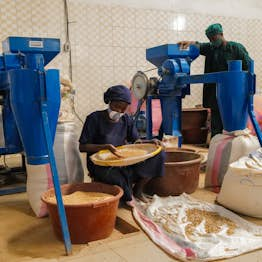Introduction
In 2021, bilateral cooperation with Mali featured the implementation of the transition strategy, which was put in place following the coup of 18 August 2020. This strategy involves the extension of the bilateral programmes in the areas of vocational training and integration into the job market, and in rural development.
Read more
The rural development programme mainly intervenes in the profitable rice, fonio and sesame industries by increasing their productivity, sustainability and profitability, in order to sustainably boost sources of income and food security for those living in Mali. In the field of training and integration into the job market, Luxembourg Development Cooperation seeks to broaden the range of high-quality vocational training on offer to enable young people and women to acquire skills that are suited to the employment market and thus to promote their access to income-generating activities. As part of the transition strategy, it was decided to implement specific interventions supporting decentralisation and good governance, in order to integrate them across the board into other activities.
It was also possible to continue with the inter-university cooperation project between the University of Luxembourg and the universities of Bamako in the field of law and economics, despite the health and political situations. In 2021, the project’s achievements included enabling seven Malian candidates to benefit from preparatory courses for the competitive examination in law, training 11 young researchers in English and organising a regional doctoral seminar in law.
Another key element was the launch of a support programme in the agro-pastoral sectors in the regions of Ségou and Sikasso, financed jointly with Switzerland, with a budget of EUR 16 million. This is designed to help increase the incomes of family agro-pastoral farms active in the local milk and potato sectors, by improving productivity and employability and by bringing together operators from the public sector, the private sector and civil society.
In order to assist the country in the implementation of its transition roadmap, it was decided to contribute EUR 200 000 to the United Nations Development Programme (UNDP) programme of support for reforms and elections in Mali (2021 – 2023), as well as making a contribution of EUR 2 million to the World Food Programme (WFP) operations in Mali, with a particular focus on strengthening the resilience of vulnerable populations to food and nutrition insecurity. Luxembourg also signed a financing agreement to contribute EUR 2.25 million to the UNDP youth entrepreneurship programme, which aims to train young people in entrepreneurship and to support them to set up their enterprises.
Development of PDA
Reference data
- Population (MIO): 20,25
- GNI (per resident): 2.250
- Human Development Index (HDI): 184/189
- Life expectancy: 60
